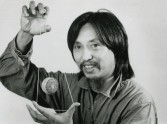


Behind the Bamboo Camera with Kidlat Tahimik
A sui generis mixture of documentary, diary film, fictionalized autobiography, cinematic essay and ethnography, Kidlat Tahimik’s 1977 debut, The Perfumed Nightmare, became an instant classic of sorts, announcing the arrival of a pioneering filmmaker. But Tahimik remains a very unusual sort of pioneer. His cinema’s sharp critique of the divides between rich and poor, capitalism and community, developed nations and the developing world relies on gentle humor, everyday experiences and childlike play. Weaving this material into knowing and heartfelt looks at life in the Philippines, Tahimik uncovers the ways in which the country’s postcolonial status places it at the center of contemporary concerns about the retreat of tradition in the face of a global marketplace dominated by an all-encompassing, ever-growing technology.
There is little in Tahimik’s early biography to indicate the career he would eventually choose. He was born Eric de Guia in Baguio in 1942 to an engineer and a woman who would be the first female mayor in the Philippines. After receiving a master’s degree from the business school at Wharton, he worked for the Organization for Economic Cooperation and Development in Paris in 1968. Uninspired by the research he was called upon to perform, he left his job to sell memorabilia at the 1972 Olympics in Munich. Afterwards, rather than returning home, he joined an artists’ commune in Munich and eventually attracted the attention of Werner Herzog, who cast him in a small part in The Enigma of Kaspar Hauser (1974). Under Herzog’s tutelage, he took up filmmaking and premiered The Perfumed Nightmare at the 1977 Berlin film festival. The film quickly traveled the world, championed in the US by Francis Ford Coppola and Susan Sontag.
Since then, Tahimik has created a string of documentaries and one fiction feature film, all of which demonstrate his love of wordplay both silly and sophisticated and his ability to blend politics and the imagination in surprising and revealing ways. — David Pendleton












